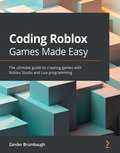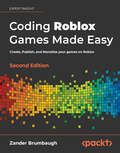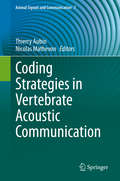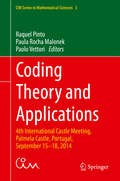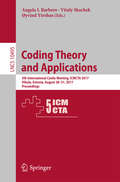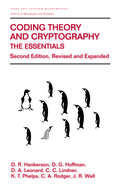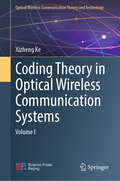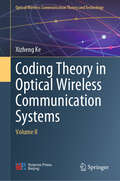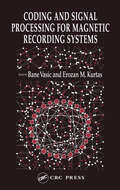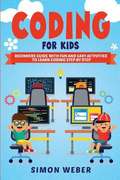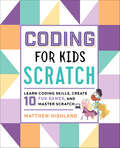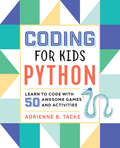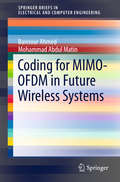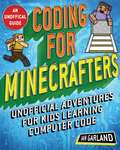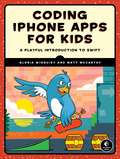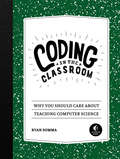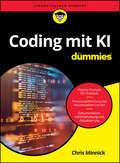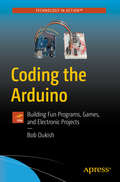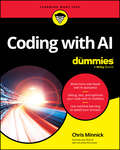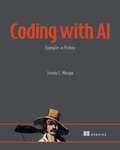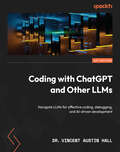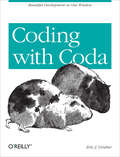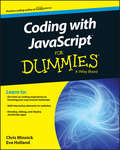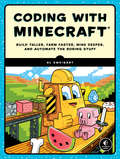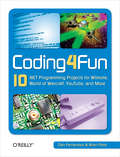- Table View
- List View
Coding Roblox Games Made Easy: The ultimate guide to creating games with Roblox Studio and Lua programming
by Zander BrumbaughGet up and running with Roblox development with the help of expert guidance for working with Roblox components and Lua programmingKey FeaturesDiscover solutions to common problems faced while creating games on RobloxExplore tips, tricks, and best practices and learn advanced Roblox coding techniques to create gamesUnderstand how to program in the Roblox Lua language, add engaging effects, add a variety of functionalities, and much moreBook DescriptionRoblox is a global virtual platform like no other for both playing and creating games. With well over 150 million monthly active users, Roblox hosts all genres of games that can be played by other members of the community using the Lua programming language. Not only can you create games for free, but you can also earn considerable sums of money if from the success of your games, and become part of the vast and supportive developer circle that provides excellent opportunities for networking in a tight-knit community. With this practical book, you'll get hands-on experience working on the Roblox platform. You'll start with an overview of Roblox development and then understand how to use Roblox Studio. As you progress, you'll gradually learn everything you need from how to program in Roblox Lua to creating Obby and Battle Royale games. Finally, you'll delve into the logistics of game production, focusing on optimizing the performance of your game by implementing impressive mechanics, monetization, and marketing practices. By the end of this Roblox book, you'll be able to lead or work with a team to bring your gaming world to life, and extend that experience to players around the world.What you will learnGet started with Roblox development and explore aspects such as choosing a developer typeUnderstand how to use Roblox Studio and other free resourcesCreate your first game with the Roblox Lua programming languageBecome well-versed with the three Ms - Mechanics, Monetization, and MarketingDevelop real-world games such as Battle Royale and ObbyDiscover expert tips for collaborating effectively and managing project workloadsWho this book is forThis Roblox guide is for anyone interested in learning how to develop games on the Roblox platform. If you're already familiar with Roblox and looking for tips, tricks, and Roblox and Lua best practices for efficient development, you'll find this book helpful.
Coding Roblox Games Made Easy: The ultimate guide to creating games with Roblox Studio and Luau programming, 2nd Edition
by Zander BrumbaughGet up and running with Roblox environment and Luau programming basics to build and share your gamesIncludes an exclusive invite to join the online Roblox game development communityKey FeaturesBegin coding in Luau: build player avatars, battlefields, game physics, countdown timers and moreLearn tips, tricks, best practices, and advanced Roblox coding techniques to create 3D gamesJoin the book club to discuss queries, provide solutions, and ask Zander for advice on your gamesBook DescriptionRoblox is a huge entertainment platform like no other for both playing and creating games. With over 200 million monthly active users, Roblox has enabled new and experienced developers to create successful games, often called experiences, that can be played globally at no cost.Coding Roblox Games Made Easy, 2nd Edition, builds a solid foundation of the concepts you need to embark on the journey of building two end-to-end games in Roblox in increasing order of complexity.For the first game, you will create obstacles and traps for an obstacle course game (obby) and overcome them to win the game alongside other players and earn rewards. In the next game, you will manage player avatars, their weapons, a battlefield and add programming logic for the players to find their weapons and fight, with a reward for the last player standing.Finally, you'll delve into the logistics of game production, focusing on optimizing your games' performance by implementing impressive mechanics, monetization, and marketing practices. We will also discuss how the Metaverse is set to change the dynamics of user experience and what the future holds for Roblox game developers.Let's create and share experiences through play!What you will learnUnderstand how to use Roblox Studio and other free resourcesLearn how to code in Luau: basics, game systems, physics manipulation, etc.Test, evaluate, and redesign to create bug-free and engaging gamesUse Roblox programming and rewards to make your first gameMove from a lobby to a battleground, build avatars and create weapons with which to fightMaster the three Ms: Mechanics, Monetization, MarketingLearn 50 cool things to do on RobloxWho this book is forGet started with building your first game on the Roblox platform. This book is for anyone interested in learning the fundamentals of Luau programming and Roblox Studio and needs direction to build and share games. If you're already familiar with Roblox and are looking for tips, tricks, and the best Roblox and Luau practices for efficient development, you'll find this book helpful.The book requires no prior knowledge of game development.
Coding Strategies in Vertebrate Acoustic Communication (Animal Signals and Communication #7)
by Thierry Aubin Nicolas MathevonInformation is a core concept in animal communication: individuals routinely produce, acquire, process and store information, which provides the basis for their social life. This book focuses on how animal acoustic signals code information and how this coding can be shaped by various environmental and social constraints. Taking birds and mammals, including humans, as models, the authors explore such topics as communication strategies for “public” and “private” signaling, static and dynamic signaling, the diversity of coded information and the way information is decoded by the receiver. The book appeals to a wide audience, ranging from bioacousticians, ethologists and ecologists to evolutionary biologists. Intended for students and researchers alike, it promotes the idea that Shannon and Weaver’s Mathematical Theory of Communication still represents a strong framework for understanding all aspects of the communication process, including its dynamic dimensions.
Coding Theory and Applications: 4th International Castle Meeting, Palmela Castle, Portugal, September 15-18, 2014 (CIM Series in Mathematical Sciences #3)
by Raquel Pinto Paula Rocha Malonek Paolo VettoriThe topics covered in this book, written by researchers at the forefront of their field, represent some of the most relevant research areas in modern coding theory: codes and combinatorial structures, algebraic geometric codes, group codes, quantum codes, convolutional codes, network coding and cryptography. The book includes a survey paper on the interconnections of coding theory with constrained systems, written by an invited speaker, as well as 37 cutting-edge research communications presented at the 4th International Castle Meeting on Coding Theory and Applications (4ICMCTA), held at the Castle of Palmela in September 2014. The event's scientific program consisted of four invited talks and 39 regular talks by authors from 24 different countries. This conference provided an ideal opportunity for communicating new results, exchanging ideas, strengthening international cooperation, and introducing young researchers into the coding theory community.
Coding Theory and Applications: 5th International Castle Meeting, ICMCTA 2017, Vihula, Estonia, August 28-31, 2017, Proceedings (Lecture Notes in Computer Science #10495)
by Ángela I. Barbero, Vitaly Skachek and Øyvind YtrehusThis book constitutes the refereed proceedings of the 5th International Castle Meeting on Coding Theory and Applications, ICMCTA 2017, held in Vihula, Estonia, in August 2017.The 24 full papers presented were carefully reviewed and selected for inclusion in this volume. The papers cover relevant research areas in modern coding theory, including codes and combinatorial structures, algebraic geometric codes, group codes, convolutional codes, network coding, other applications to communications, and applications of coding theory in cryptography.
Coding Theory and Cryptography: The Essentials, Second Edition (Chapman & Hall/CRC Pure and Applied Mathematics)
by Charles C. Lindner Gary Hoffman D.C. Hankerson D.A. Leonard K.T. Phelps C.A. Rodger J.R. WallContaining data on number theory, encryption schemes, and cyclic codes, this highly successful textbook, proven by the authors in a popular two-quarter course, presents coding theory, construction, encoding, and decoding of specific code families in an "easy-to-use" manner appropriate for students with only a basic background in mathematics offerin
Coding Theory in Optical Wireless Communication Systems: Volume I (Optical Wireless Communication Theory and Technology)
by Xizheng KeThis book focuses on optical-wireless communication systems. It summarizes the author's optical-wireless communication coding work while carrying out pertinent scientific research programs. The primary topics covered in the book are channel coding, coding modulation, error control (channel coding), and channel equalization. The author's mathematical analysis and experimental studies on the key theoretical issues are discussed in the book. One of the book's outstanding aspects is its thorough and methodical discussion of practical optical-wireless communication challenges. This makes the book especially appealing to readers who are eager to learn about applicable solutions in this area. Researchers, engineers, and graduate students in the subject of telecommunications can all profit from the book. It is appropriate for senior undergraduates, lecturers at colleges and universities, graduate students, and engineering and technical workers involved in optical communication.
Coding Theory in Optical Wireless Communication Systems: Volume II (Optical Wireless Communication Theory and Technology)
by Xizheng KeThis book focuses on optical-wireless communication systems. It summarizes the author's optical-wireless communication coding work while carrying out pertinent scientific research programs. The primary topics covered in the book are channel coding, coding modulation, error control (channel coding), and channel equalization. The author's mathematical analysis and experimental studies on the key theoretical issues are discussed in the book. One of the book's outstanding aspects is its thorough and methodical discussion of practical optical-wireless communication challenges. This makes the book especially appealing to readers who are eager to learn about applicable solutions in this area. Researchers, engineers, and graduate students in the subject of telecommunications can all profit from the book. It is appropriate for senior undergraduates, lecturers at colleges and universities, graduate students, and engineering and technical workers involved in optical communication.
Coding and Signal Processing for Magnetic Recording Systems (Computer Engineering Series)
by BaneVasic Erozan M. KurtasImplementing new architectures and designs for the magnetic recording read channel have been pushed to the limits of modern integrated circuit manufacturing technology. This book reviews advanced coding and signal processing techniques and architectures for magnetic recording systems. Beginning with the basic principles, it examines read/write operations, data organization, head positioning, sensing, timing recovery, data detection, and error correction. It also provides an in-depth treatment of all recording channel subsystems inside a read channel and hard disk drive controller. The final section reviews new trends in coding, particularly emerging codes for recording channels.
Coding for Kids: Beginners Guide With Fun And Easy Activities To Learn Coding Step By Step
by Simon WeberThis book is intended for children who wish to learn programming and computing. In this day and age, computer knowledge, or literacy, if we may call it that, is of huge importance for every person, from early childhood on through to his or her adult, professional lives. Even in the preschool system, children very often have tasks given to them by their teachers, which require the use of computers to a certain extent. That is precisely the reason this book would be of good use both for teachers and for children. Teachers will get help on the topic of how to bring the computer closer to children, and children get the opportunity to learn their first basic knowledge of computers and their use. They also get their first clues on the benefits computers can bring to them and their lives.
Coding for Kids: Learn Coding Skills, Create 10 Fun Games, and Master Scratch
by Matthew HighlandLearn to code awesome games with Scratch—a fun starter guide for kids 6 to 10Explore basic coding concepts and skills and start creating your own games right away! Coding for Kids: Scratch is a complete guide that makes mastering the Scratch programming language fun and easy for kids.From sprites and code blocks to scripts and scorekeeping, Coding for Kids: Scratch helps you discover everything you need to know to create 10 amazing games that you and your friends can play. Watch your confidence grow with step-by-step instructions and clear directions that keep things simple—even as the games you're making get more challenging. Game on!Coding for Kids: Scratch includes:Coding for kids—Learn Scratch terms and concepts, then use them to build games you can start playing immediately.Create 10 games—Cake Clicker, Dino Hunt, Crystal Keeper, and more—code, play, and share 10 cool games.Master Scratch—Simple directions, full-color screenshots, and projects that get more difficult make practicing Scratch a breeze.Make coding for kids fun and games with Coding for Kids: Scratch.
Coding for Kids: Learn to Code with 50 Awesome Games and Activities
by Adrienne B. TackeGames and activities that teach kids ages 10+ to code with Python Learning to code isn't as hard as it sounds—you just have to get started! Coding for Kids: Python starts kids off right with 50 fun, interactive activities that teach them the basics of the Python programming language. From learning the essential building blocks of programming to creating their very own games, kids will progress through unique lessons packed with helpful examples—and a little silliness! Kids will follow along by starting to code (and debug their code) step by step, seeing the results of their coding in real time. Activities at the end of each chapter help test their new knowledge by combining multiple concepts. For young programmers who really want to show off their creativity, there are extra tricky challenges to tackle after each chapter. All kids need to get started is a computer and this book. This beginner's guide to Python for kids includes: 50 Innovative exercises—Coding concepts come to life with game-based exercises for creating code blocks, drawing pictures using a prewritten module, and more. Easy-to-follow guidance—New coders will be supported by thorough instructions, sample code, and explanations of new programming terms. Engaging visual lessons—Colorful illustrations and screenshots for reference help capture kids' interest and keep lessons clear and simple. Encourage kids to think independently and have fun learning an amazing new skill with this coding book for kids.
Coding for MIMO-OFDM in Future Wireless Systems (SpringerBriefs in Electrical and Computer Engineering)
by Bannour Ahmed Mohammad Abdul MatinThis book introduces the reader to the MIMO-OFDM system, in Rayleigh frequency selective-channels. Orthogonal frequency division multiplexing (OFDM) has been adopted in the wireless local-area network standards IEEE 802. 11a due to its high spectral efficiency and ability to deal with frequency selective fading. The combination of OFDM with spectral efficient multiple antenna techniques makes the OFDM a good candidate to overcome the frequency selective problems.
Coding for Minecrafters: Unofficial Adventures for Kids Learning Computer Code
by Ian GarlandLearn to Code while Adventuring through the Overworld!This fun and educational activity book Introduces kids to the world of coding through the Minecraft world they love. Colorfully illustrated characters and themes from their favorite video game bring the excitement of coding to life, while easy-to-follow screenshots guide them through activities. With adventures that include design, music, animation, gaming, and more, learners will discover tons of ways coding connects to other activities they love and how far a little imagination and invention can take them…to The End and beyond! Minecrafting-themed characters help kids become master coders Kid-friendly concepts and steps designed specifically for ages 8-12 Great games, mods, experiments, and more teach computational thinking—how to tackle large problems by breaking them down into a sequence of smaller, more manageable problems Whether brand-new to coding or looking for more hands-on learning, Coding for Minecrafters helps young coders advance in technology education by leaps and bounds—and have fun doing it!
Coding iPhone Apps for Kids: A Playful Introduction To Swift
by Matt Mccarthy Gloria WinquistApple’s Swift is a powerful, beginner-friendly programming language that anyone can use to make cool apps for the iPhone or iPad. In Coding iPhone Apps for Kids, you’ll learn how to use Swift to write programs, even if you’ve never programmed before.You’ll work in the Xcode playground, an interactive environment where you can play with your code and see the results of your work immediately! You’ll learn the fundamentals of programming too, like how to store data in arrays, use conditional statements to make decisions, and create functions to organize your code—all with the help of clear and patient explanations.Once you master the basics, you’ll build a birthday tracker app so that you won’t forget anyone’s birthday and a platform game called Schoolhouse Skateboarder with animation, jumps, and more!As you begin your programming adventure, you’ll learn how to:–Build programs to save you time, like one that invites all of your friends to a party with just the click of a button!–Program a number-guessing game with loops to make the computer keep guessing until it gets the right answer–Make a real, playable game with graphics and sound effects using SpriteKit–Challenge players by speeding up your game and adding a high-score systemWhy should serious adults have all the fun? Coding iPhone Apps for Kids is your ticket to the exciting world of computer programming.Covers Swift 3.x and Xcode 8.x. Requires OS X 10.11 or higher.
Coding in the Classroom: Why You Should Care About Teaching Computer Science
by Ryan SommaA book for anyone teaching computer science, from elementary school teachers and coding club coaches to parents looking for some guidance.Computer science opens more doors for today's youth than any other discipline - which is why Coding in the Classroom is your key to unlocking students' future potential. Author Ryan Somma untangles the current state of CS education standards; describes the cognitive, academic, and professional benefits of learning CS; and provides numerous strategies to promote computational thinking and get kids coding! Whether you're a teacher, an after-school coach, or a parent seeking accessible ways to boost your kid's computer savvy, Coding in the Classroom is here to help. With quick-start programming strategies, scaffolded exercises for every grade level, and ideas for designing CS events that promote student achievement, this book is a rock-solid roadmap to CS integration from a wide variety of on-ramps. You'll learn: • tips and resources for teaching programming concepts via in-class activities and games, without a computer • development environments that make coding and sharing web apps a breeze • lesson plans for the software lifecycle process and techniques for facilitating long-term projects • ways to craft interdisciplinary units that bridge CS and computational thinking with other content areas Coding in the Classroom does more than make CS less formidable - it makes it more fun! From learning computational thinking via board games to building their own websites, students are offered a variety of entry points for acquiring the skills they need to succeed in the 21st-century workforce. Moreover, Somma understands how schools operate - and he's got your back. You'll be empowered to advocate for the value of implementing CS across the curriculum, get stakeholder buy-in, and build the supportive, equitable coding community that your school deserves.
Coding mit KI für Dummies (Für Dummies)
by Chris MinnickLassen Sie sich beim Programmieren assistieren Von der Prozessautomatisierung über die Code-Optimierung bis hin zur Erledigung von Kernaufgaben wie Dokumentation, Debugging und Aktualisierung – künstliche Intelligenz hilft Ihnen dabei, sich auf den Kern Ihrer Entwicklungsarbeit zu konzentrieren. In diesem Buch lernen Sie die wichtigsten Plattformen kennen, mit denen Sie neuen Code schreiben und Ihre Codequalität verbessern können. Sie erfahren, welche Möglichkeiten und welche Grenzen die KI-Tools haben und wie Sie diese für Routineaufgaben einsetzen. So behalten Sie den Kopf frei für die wichtigen Aufgaben. Sie erfahren Welche Tools und Plattformen Sie kennen sollten Wie Sie die Lesbarkeit von Code verbessern Wie Sie Bugs mithilfe von KI beseitigen Wie Sie mithilfe von KI Ihren Code wartungsfreundlicher gestalten
Coding the Arduino: Building Fun Programs, Games, and Electronic Projects
by Bob DukishGet started with Arduino and computer coding. This book is intended for those new to the Arduino and computer coding. and looking to gain the skills to write microcontroller programs that can act on given inputs and operate electromechanical output devices. Coding the Arduino contains four sections: background information, game development, electronic games and projects, and expanded programs. The final chapters expand on the functionality of some of the programs presented in previous chapters, and challenges you with capstone projects. The projects will be described where the program code that is presented can be modified, or in which two or more of the sample programs may be used to synthesize a new program as the solution to the problem that is presented. Additionally, review questions are presented at the end of each chapter to test your comprehension of the material. What You'll LearnUnderstand basic principles of technology, and about analog and digital electronics.Create games from scratch, where you interactively play against the program.Gain an introduction to Artificial Intelligence (AI)Who This Book Is ForElectronic hobbyists, makers of all levels, and teens with an interest in technology and coding who are looking to get started with Arduinos.
Coding with AI For Dummies
by Chris MinnickBoost your coding output and accuracy with artificial intelligence tools Coding with AI For Dummies introduces you to the many ways that artificial intelligence can make your life as a coder easier. Even if you’re brand new to using AI, this book will show you around the new tools that can produce, examine, and fix code for you. With AI, you can automate processes like code documentation, debugging, updating, and optimization. The time saved thanks to AI lets you focus on the core development tasks that make you even more valuable. Learn the secrets behind coding assistant platforms and get step-by-step instructions on how to implement them to make coding a smoother process. Thanks to AI and this Dummies guide, you’ll be coding faster and better in no time. Discover all the core coding tasks boosted by artificial intelligence Meet the top AI coding assistance platforms currently on the market Learn how to generate documentation with AI and use AI to keep your code up to date Use predictive tools to help speed up the coding process and eliminate bugs This is a great Dummies guide for new and experienced programmers alike. Get started with AI coding and expand your programming toolkit with Coding with AI For Dummies.
Coding with AI: Examples in Python
by Jeremy MorganPractical techniques to accelerate software development using generative AI.Let&’s get real. You&’d like to hand off a lot of tedious software development tasks to an assistant—and now you can! AI-powered coding tools like Copilot can accelerate research, design, code creation, testing, troubleshooting, documentation, refactoring and more. Coding with AI shows you how. Written for working developers, this book fast-tracks you to AI-powered productivity with bite-size projects, tested prompts, and techniques for getting the most out of AI. In Coding with AI you&’ll learn how to: • Incorporate AI tools into your development workflow • Create pro-quality documentation and tests • Debug and refactor software efficiently • Create and organize reusable prompts Coding with AI takes you through several small Python projects with the help of AI tools, showing you exactly how to use AI to create and refine real software. This book skips the baby steps and goes straight to the techniques you&’ll use on the job, every day. You&’ll learn to sidestep AI inefficiencies like hallucination and identify the places where AI can save you the most time and effort. About the technology Taking a systematic approach to coding with Al will deliver the clarity, consistency, and scalability you need for production-grade applications. With practice, you can use AI tools to break down complex problems, generate maintainable code, enhance your models, and streamline debugging, testing, and collaboration. As you learn to work with AI&’s strengths—and recognize its limitations—you&’ll build more reliable software and find that the quality of your generated code improves significantly. About the book Coding with AI shows you how to gain massive benefits from a powerful array of AI-driven development tools and techniques. And it shares the insights and methods you need to use them effectively in professional projects. Following realistic examples, you&’ll learn AI coding for database integration, designing a UI, and establishing an automated testing suite. You&’ll even vibe code a game—but only after you&’ve built a rock-solid foundation. What's inside • Incorporate AI into your development workflow • Create pro-quality documentation and tests • Debug and refactor software efficiently • Create and organize reusable prompts About the reader For professional software developers. Examples in Python. About the author Jeremy C. Morgan has two decades of experience as an engineer building software for everything from Fortune 100 companies to tiny startups. Table of Contents Part 1 1 Introducing generative AI 2 First steps with AI-assisted coding Part 2 3 Design and discovery 4 Coding the first version of our application 5 Using Blackbox AI to generate base code 6 Generating a software backend with Tabnine Part 3 7 Building user interfaces with ChatGPT 8 Building effective tests with generative AI 9 Prompt engineering 10 Vibe coding with Cursor
Coding with ChatGPT and Other LLMs: Navigate LLMs for effective coding, debugging, and AI-driven development
by Dr. Vincent HallLeverage LLM (large language models) for developing unmatched coding skills, solving complex problems faster, and implementing AI responsiblyKey FeaturesUnderstand the strengths and weaknesses of LLM-powered software for enhancing performance while minimizing potential issuesGrasp the ethical considerations, biases, and legal aspects of LLM-generated code for responsible AI usageBoost your coding speed and improve quality with IDE integrationPurchase of the print or Kindle book includes a free PDF eBookBook DescriptionKeeping up with the AI revolution and its application in coding can be challenging, but with guidance from AI and ML expert Dr. Vincent Hall—who holds a PhD in machine learning and has extensive experience in licensed software development—this book helps both new and experienced coders to quickly adopt best practices and stay relevant in the field. You’ll learn how to use LLMs such as ChatGPT and Bard to produce efficient, explainable, and shareable code and discover techniques to maximize the potential of LLMs. The book focuses on integrated development environments (IDEs) and provides tips to avoid pitfalls, such as bias and unexplainable code, to accelerate your coding speed. You’ll master advanced coding applications with LLMs, including refactoring, debugging, and optimization, while examining ethical considerations, biases, and legal implications. You’ll also use cutting-edge tools for code generation, architecting, description, and testing to avoid legal hassles while advancing your career. By the end of this book, you’ll be well-prepared for future innovations in AI-driven software development, with the ability to anticipate emerging LLM technologies and generate ideas that shape the future of development.What you will learnUtilize LLMs for advanced coding tasks, such as refactoring and optimizationUnderstand how IDEs and LLM tools help coding productivityMaster advanced debugging to resolve complex coding issuesIdentify and avoid common pitfalls in LLM-generated codeExplore advanced strategies for code generation, testing, and descriptionDevelop practical skills to advance your coding career with LLMsWho this book is forThis book is for experienced coders and new developers aiming to master LLMs, data scientists and machine learning engineers looking for advanced techniques for coding with LLMs, and AI enthusiasts exploring ethical and legal implications. Tech professionals will find practical insights for innovation and career growth in this book, while AI consultants and tech hobbyists will discover new methods for training and personal projects.
Coding with Coda: Beautiful Development in One Window
by Eric J GruberLike to build websites in the wild with your MacBook? This concise hands-on guide introduces you to the ideal editor: Coda 2. Rather than clutter your screen with shell access, a separate CSS editor, and a version control app, you’ll discover how Coda’s "one-window web development" bundles everything into one neat application. Take Coda on a trial run, then learn step-by-step how to configure each feature to fit your working style. You’ll find out firsthand how Coda will save you time and effort on your next project.Get to know Coda’s workflow by building a sample siteDelve into features such as the tab bar, path bar, sidebar, and Sites viewSet up your own development environment—and dig deeper into the editor’s optionsGet tips for taking full advantage of the text and MySQL editorsCreate a Git or Subversion repository for source control managementLearn the finer points of sharing project documents across a networkDiscover the built-in reference books, and learn how to extend Coda
Coding with JavaScript For Dummies
by Chris Minnick Eva Hollandbeginner to builder quickly as you:Learn what Java does, how it works, and where to use itMaster the core elements of JavaScript and immediately put it to workBuild interactive web elements and try out your code onlineCreate basic applications as you apply Java to the app development workflowAnytime a website responds to your movement around the screen, that's Java. It makes websites more functional, more beautiful, and more engaging, and your site visitors will demand nothing less. If you want to build a better website, you need JavaScript. If you need JavaScript, Coding with JavaScript For Dummies gets you started off quickly and painlessly, with plenty of hands-on practice.
Coding with Minecraft: Build Taller, Farm Faster, Mine Deeper, and Automate the Boring Stuff
by Al SweigartA hands-on introduction to coding that teaches you how to program bots to do cool things in the game you love--Minecraft! This book takes the robotic "turtle" method, and extends it to the 3D, interactive world of Minecraft.You've mined for diamonds, crafted dozens of tools, and built all sorts of structures--but what if you could program robots to do all of that for you in a fraction of the time?In Coding with Minecraft®, you'll create a virtual robot army with Lua, a programming language used by professional game developers. Step-by-step coding projects will show you how to write programs that automatically dig mines, collect materials, craft items, and build anything that you can imagine. Along the way, you'll explore key computer science concepts like data types, functions, variables, and more. Learn how to:- Program robots that make smart decisions with flow control- Reuse code so that your robots can farm any crop you want, including wheat, sugar cane, and even cacti!- Program a factory that generates infinite building supplies- Design an algorithm for creating walls and buildings of any size- Code yourself a pickaxe-swinging robotic lumberjack!- Create a robot that digs mine shafts with stairs so you can explore safelyBonus activities in each chapter will help you take your coding skills to the next level. By the end of the book, you'll understand how powerful coding can be and have plenty of robots at your beck and call.
Coding4Fun: 10 .NET Programming Projects for Wiimote, YouTube, World of Warcraft, and More
by Brian Peek Dan FernandezHow would you like to build an Xbox game, use your Nintendo Wiimote to create an electronic whiteboard, or build your own peer-to-peer application? Coding4Fun helps you tackle some cool software and hardware projects using a range of languages and free Microsoft software. Now you can code for fun with C#, VB, ASP.NET, WPF, XNA Game Studio, Popfly, as well as the Lua programming language. <P> If you love to tinker, but don't have time to figure it all out, this book gives you clear, step-by-step instructions for building ten creative projects, including:<P> * Alien Attack: Create a 2D clone of Space Invaders with XNA for the PC, Xbox 360, and Zune <P> * LEGO Soldier: Create an action game using Popfly with a custom-built virtual LEGO character <P> * World of Warcraft RSS Feed Reader: Use WoW's customizable interface to have feeds pop up while you're gaming <P> * InnerTube: Download YouTube videos automatically and convert them to a file format for off-line viewing <P> * PeerCast: Stream video files from any PC <P> * TwitterVote: Create custom online polls on Twitter <P> * WHSMail: Build a website with ASP.NET for Windows Home Server that lets you view the messages stored on a computer with Outlook <P> * "Wiimote" Controlled Car: Steer your remote-controlled car by tilting the Wii Remote controller left and right <P> * Wiimote Whiteboard: Create an interactive whiteboard using a Wii Remote <P> * Holiday Lights: Synchronize your holiday light display with music to create your own light show<P> The perfect gift for any developer, Coding4Fun shows you how to use your programming skills in new and fun ways."This book is amazing! The scope is so wonderfully broad that anyone who has an interest in designing games at any level should read this book." -- Alex Albrecht, Creator of Diggnation / Totally Rad Show / Project Lore
